
STEP AHEAD WITH A LEVELS


STEP AHEAD WITH A LEVELS
Welcome to the next chapter of your journey - one that opens doors, builds confidence, and gets you Future Ready.
At Wigan & Leigh College, our A Level programme is designed to give you the best of both worlds - exceptional academic qualifications and the professional skills and real-world experience that help you stand out from the crowd. You won’t just leave with impressive results - you’ll leave ready for university, apprenticeships, or the world of work, with the confidence and experience to succeed.
Our A Level programme is one of the most flexible in the region, offering three distinct routes. You can choose a traditional mix of subjects, or opt for a focused pathway linked to specific careers such as medicine, law, or business - all taught by passionate subject experts in smaller class sizes where you get the attention and support you need to thrive.
With outstanding pass and achievement rates, we’re proud to offer an academic experience that delivers real results. But success is about more than grades - it’s about growing as a person. That’s why we offer a rich programme of enrichment, guest speakers, national competitions, mentoring, travel opportunities, and university visits to broaden your horizons and grow your confidence.
At Wigan & Leigh College, we don’t just prepare you for exams. We prepare you for university, for careers, for life.
Anna Dawe Principal, Wigan & Leigh College
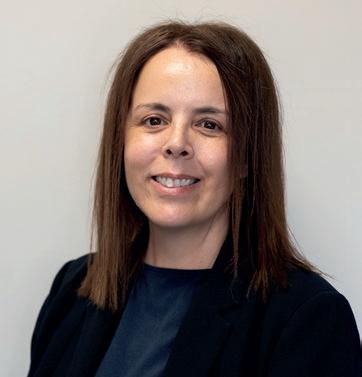

You’ll stand out from other university applicants with the best academic qualifications, plus professional and work-related skills.
Smaller class sizes and one-to-one support.
Extra academic support tutorials individually or in small groups.
Specific support for UKCAT and BMAT qualifications and mock interviews.
Take part in enterprise projects and local and national competitions.
Enrichment opportunities enhance your university applications, while work placements and guest speaker programmes make sure you stand out from the rest.
Choose one of the following routes to get future ready. We deliver A Levels at our Parsons Walk and Leigh Campuses.
You’re in control of your subject choice, great if you’re not sure about your future career.
CHOOSE THREE OR FOUR FROM THE FOLLOWING:
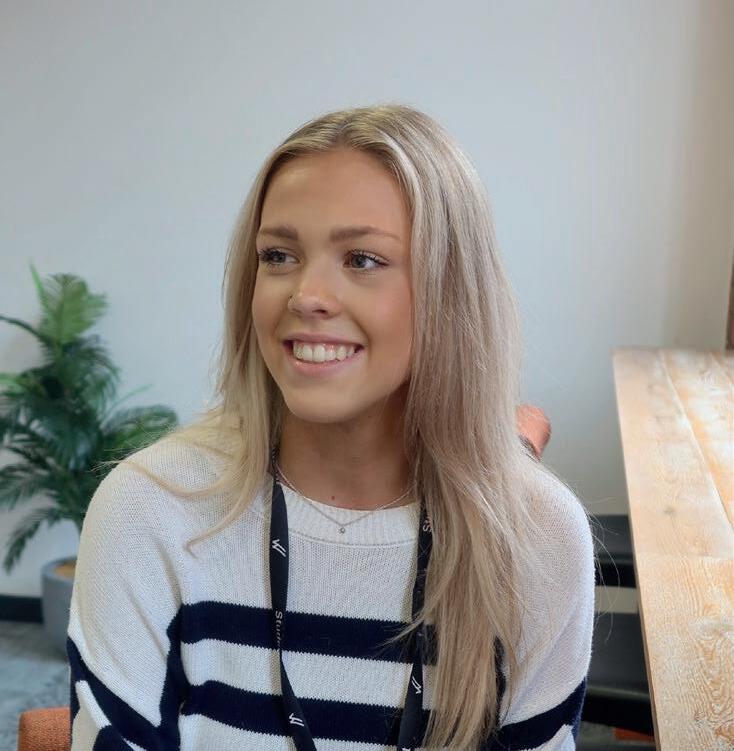
100% PASS RATE AND 88% HIGH GRADES FOR CLASS OF 2024/25
BIOLOGY
BUSINESS
CHEMISTRY
COMPUTER SCIENCE
ECONOMICS
ENGLISH LANGUAGE & LITERATURE
FINE ART
ENGLISH LITERATURE
HISTORY
MATHEMATICS
MEDIA STUDIES
PHYSICS
POLITICS
PSYCHOLOGY
SOCIOLOGY
You can take three A Levels focused on a particular career field (four AS Levels in your first year).
WE DELIVER A LEVELS AT OUR PARSONS WALK AND LEIGH CAMPUSES
You’ll also study professional qualifications relating to your career and complete a sector relevant work placement, gain extra qualifications and have masterclasses from industry experts.
APPLIED MEDICAL & HEALTH PROFESSIONAL
• Biology, Chemistry, Mathematics +1 other
• Biology, English Language & Literature* OR English Literature, Psychology OR Sociology +1 other
LAW & CRIMINOLOGY
• English Language & Literature* OR English Literature, History, Politics +1 other
• Sociology, Psychology, History +1 other
CREATIVE STUDIES
• English Language & Literature* OR English Literature, Fine Art† , Media Studies +1 other
SCIENCE, TECHNOLOGY, ENGINEERING & MATHS (STEM)
• Chemistry, Mathematics, Physics +1 other
• Computer Science, Mathematics, Physics +1 other
ECONOMICS & BUSINESS
• Business , Economics, Politics +1 other
SOCIAL SCIENCE & HUMANITIES
• Psychology, Sociology, History +1 other
• English Language & Literature* OR English Literature, History, Politics +1 other
• English Language & Literature* OR English Literature, Psychology, Sociology +1 other
If you prefer a combination of assignments and exams, Extended Choices are the best route for you.
If you attend Parsons Walk, you can study a mixed programme of A Levels and a BTEC Level 3 qualification, equivalent to one A Level.
This is an alternative route to university and degree apprenticeships.
Choose two A Levels and a Level 3 BTEC Extended Certificate, (equivalent to one A Level) to prepare for health and science; business and law; criminology; film & digital media; and computing related careers.
The country’s top universities accept this combination of A Levels with a practical, coursework focused qualification. However, if you’d like a career in medicine or veterinary science, you’ll need to take the A Level Professional Pathway in Applied Medical and Health.
Extended Choices are available at Parsons Walk Campus with the Criminology Extended Choice available at both Parsons Walk Campus and Leigh Campus
BUSINESS & LAW RELATED CAREERS
You’ll need a minimum of 5 GCSE subjects graded 9-5 including English and Maths.
To study A Level English, you’ll need a grade 6 at GCSE.
(choose two from the following)
• Economics
• English Language & Literature* OR English Literature
• History
• Politics
COMPUTING & TECHNOLOGY RELATED CAREERS
You’ll need a minimum of 5 GCSE subjects graded 9-5 including English and Maths.
To study A Level Mathematics or Science, you’ll need a grade 6 at GCSE.
(choose two from the following)
• Business
• Chemistry
• English Language and Literature* OR English Literature
• Mathematics
• Physics
BTEC LEVEL 3 EXTENDED CERTIFICATE IN BUSINESS
SKILLS FOR SUCCESS: You’ll develop skills critical to your success in business.
BUSINESS ENTERPRISE AND MARKETING: Create and present your own marketing campaign, explore different types of businesses and calculate business finance.
BTEC LEVEL 3 EXTENDED CERTIFICATE IN COMPUTING
INSIDE THE MACHINE: You’ll learn how a computer works and organises data.
PROGRAMMING & SECURITY SYSTEMS: You’ll be introduced to programming constructs in different languages, learning about object oriented and procedural programming. And you’ll explore data security and encryption techniques.
*
CRIMINOLOGY
You’ll need a minimum of 5 GCSE subjects graded 9-5 including English and Maths. To study A Level English, you’ll need a grade 6 at GCSE.
(Criminology Extended Choice available at both Parsons Walk Campus and Leigh Campus).
(choose two from the following)
• English Language and Literature* OR English Literature
• History or Media
• Politics or Business
• Sociology or Economics
HEALTH RELATED CAREERS
You’ll need a minimum of 5 GCSE subjects graded 9 - 5 including English and Maths. If you study A Level Mathematics or Science, you’ll need a grade 6 at GCSE.
Want to study medicine or veterinary science? Choose our Career Pathways route.
(choose two from the following)
• Chemistry
• Mathematics
• Physics
MEDIA & DIGITAL RELATED CAREERS
You’ll need a minimum of 5 GCSE subjects graded 9-5 including English and Maths. To study A Level English, you’ll need a grade 6 at GCSE.
(choose two from the following)
• Business
• English Language and Literature* OR English Literature
• Media Studies
• Sociology
BTEC LEVEL 3 EXTENDED CERTIFICATE IN CRIMINOLOGY CHANGING AWARENESS OF CRIME: Understand different types of crime, why some go unreported, and how campaigns can change public perception.
CRIMINOLOGICAL THEORIES: Explore why people commit crime through psychological, socio-logical, and biological explanations.
CRIME SCENE TO COURTROOM: Learn how crimes are investigated and processed through the legal system, from evidence collection to court proceedings.
CRIME AND PUNISHMENT: Examine how the criminal justice system operates and the effectiveness of different punishments.
BTEC LEVEL 3 EXTENDED CERTIFICATE IN APPLIED BIOLOGY
THE HUMAN BODY: You’ll learn human anatomy and physiology, from the molecules we depend on, to the function of the human body.
TREATING DISEASE: You’ll get the chance to develop practical skills in microbiology, including the identification of diseases and the selection of appropriate antibiotics.
RESEARCH AND IMPACT: You’ll spend time analysing data and research for human health, and study issues surrounding fertility and reproductive technology.
BTEC LEVEL 3 EXTENDED CERTIFICATE IN DIGITAL FILM & VIDEO PRODUCTION
INDUSTRY SKILLS: You’ll develop skills in technical roles such as single and multi camera productions, sound recording and editing.
LIGHTS, CAMERA, ACTION: We’ll prepare you for creative media roles such as postproduction runner, broadcast assistant, assistant to camera crew and many more.
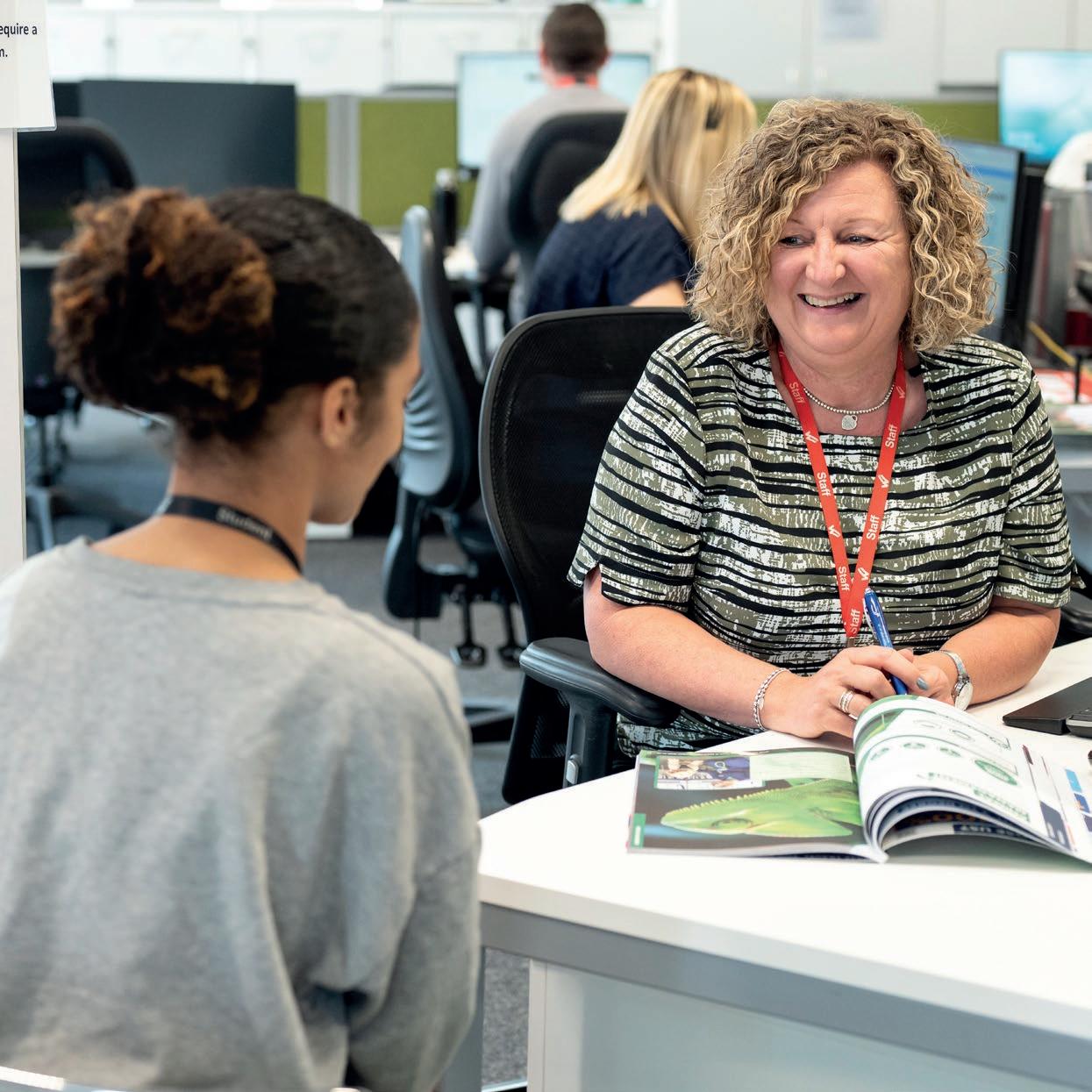
Studying A Levels with us isn’t just about achieving a qualification.
Each week you’ll have an Academic Development Day, when you’ll study extra qualifications and do placements or voluntary work to develop the skills and attributes that top universities and employers are looking for.
You might want to get involved in:
• career related work placement/internship
• charity fundraising activities
• mock interviews for university and higher/ degree apprenticeships
• UCAS preparation
• First Aid qualification
• A Level magazine production
• HE+ Programme in partnership with Cambridge University.
The EPQ is a self-directed project you’ll work on in your second year. It adds value to university applications, as well as UCAS points.
You’ll explore a topic outside of your A Level subject curriculum, planning, researching and developing an idea to produce a researchbased written report.
Look out for Academic Development Day activities in the following subject area pages.
As an A Level student you’ll have the best support to help you make the most of your time getting future ready with us.
Your timetable will include regular one-to-one meetings with your Personal Tutor. These meetings are important, as they provide the opportunity for you to work together, helping you both assess your progress and remove any barriers to success.
They will:
• guide you through your course
• create an action plan to help you reach your goals
• track your progress and achievements
• help you access support
• offer advice about overcoming challenges.
There are lots of staff at college to help during your time as a student, including the Head of Studies team who play an important role supporting you to:
• Have fun through enrichment and volunteering activities, but also succeed on your course.
• Monitor and manage attendance.
• Push your grades to above the minimum expected.
• Set, monitor and review targets for improvement.
• Develop resilience.
• Apply for student leadership roles.
• Overcome difficulties.
• Support you with cost of living, wellbeing, housing and health related issues.
The Learning Resources Centre (LRC) at Parsons Walk is a modern and spacious environment offering a multifunctional way to study.
There’s a fast access PC zone, increased laptop and PC capacity, reading and wellbeing area, with lots of working spaces for group, project and individual study.
Leigh Campus also has an LRC and a library with access to a wide range of books, magazines, newspapers, subject specific publications, DVDs and CDs.
You can access computers and online resources, including the college intranet, Office applications, e-books, WiFi access and Moodle - the college VirtualLearning Environment (VLE).
Staff are always on hand to help with enquiries and support for you to find the most relevant information relating to your course.

Alongside your studies, you’ll develop new interests, improve your knowledge base, pick up new skills and boost your self-confidence on trips at home and abroad. Your future ready experiences are not only loads of fun, but great content for university and job applications, as well as the interviews that will follow.
Business and Economics students performed tremendously well to reach the final of the 100-Day Entrepreneur Challenge, hosted by Lancaster University.
The competition was an opportunity to present their business ideas to a panel of successful entrepreneurs. The event was a great learning experience that boosted their confidence and strengthened their teamwork skills.


A trip to Jodrell Bank Observatory lifted the lid on the design, production and use of radio telescopes.
Students also explored the Lovell Museum and wider grounds, with interactive exhibits, that included a thermal camera, learning more about calculating the mass of the galaxy. They watched a film in the Space Dome planetarium about the link between our human make up and the death of the stars.
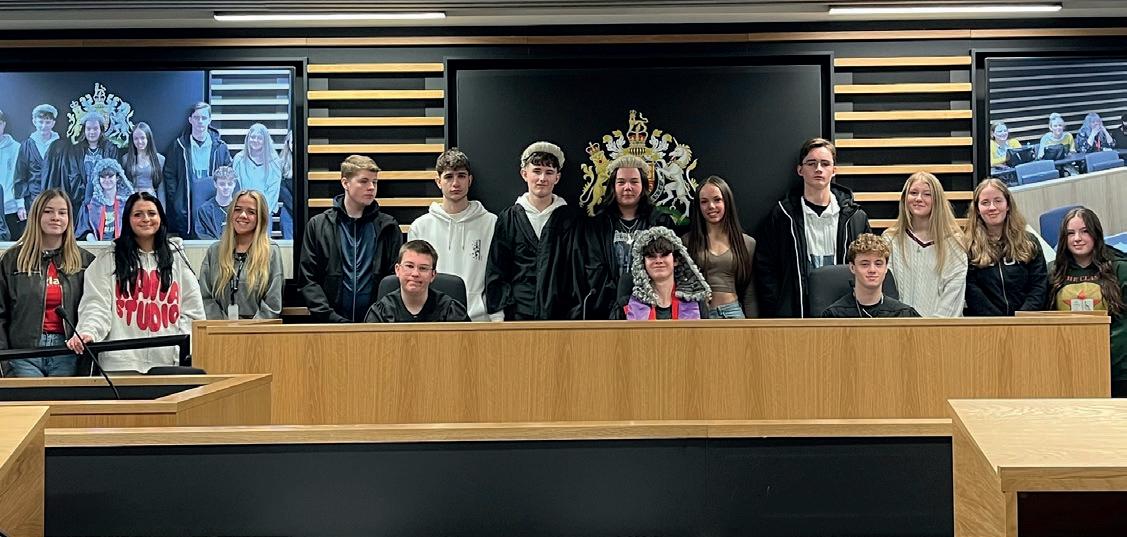
Learners interested in a career within law, visited the Manchester Moot Courts at Manchester Metropolitan University where they completed a full mock trial, playing various roles including barrister, judge and solicitor and even had a jury to decide if the case was a guilty or non-guilty verdict.
A level HE+ students were invited to visit Sidney Sussex College to experience aspects of studying at University of Cambridge.
They received guidance on the application process, enjoyed sessions of discussion on current affairs and participated in activities based around oracy and public speaking, which they were particularly successful at.
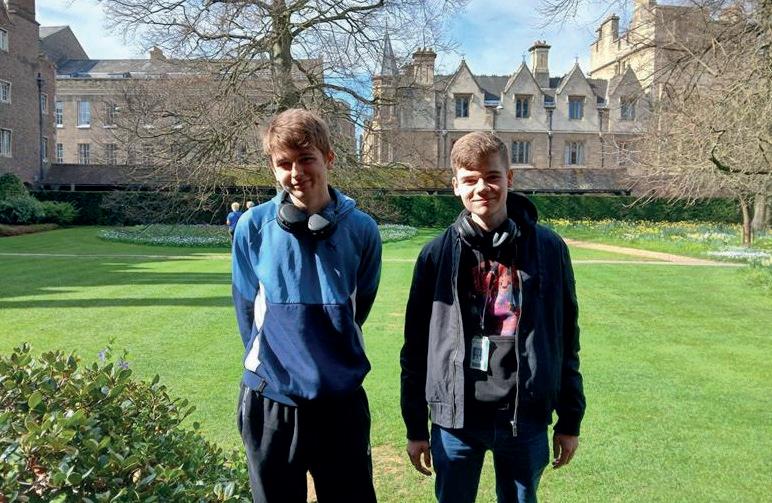
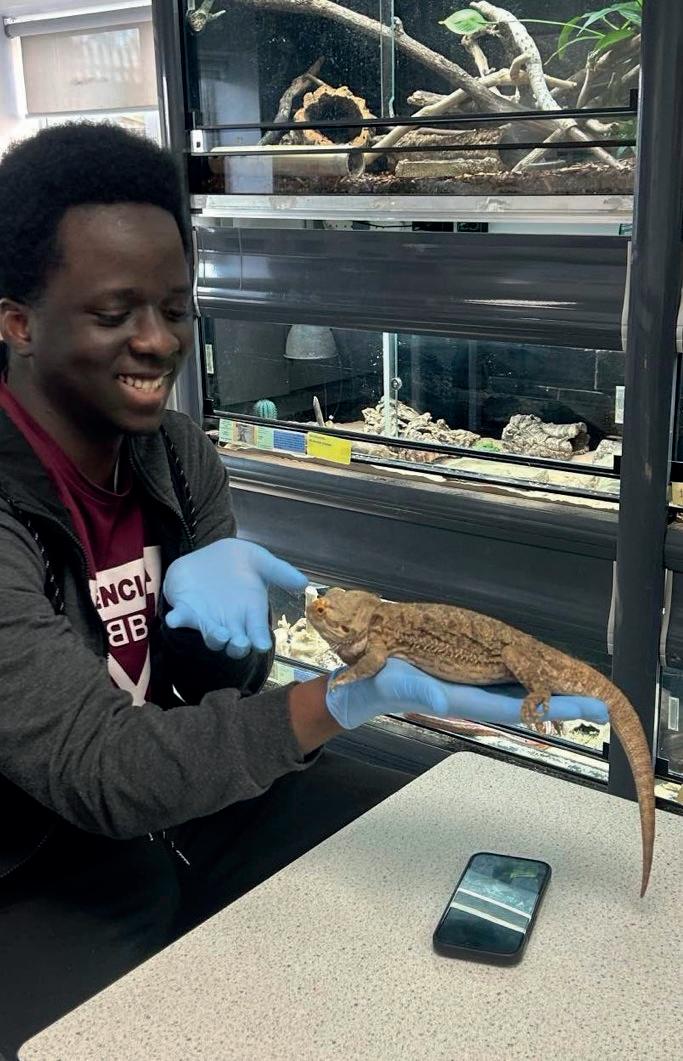
Students visited our Animal Management team for a ‘Meet the Reptiles’ session where they were able to learn more about a range of reptiles, while others took part in a yoga session for some relaxation.
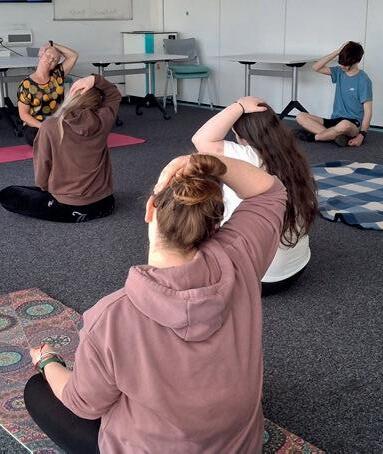
Our students spent an amazing week in the Big Apple where they visited the Natural History Museum and watched the musical, Hamilton on Broadway.
Other famous landmarks such as Grand Central Station, the United Nations, the Brooklyn and Manhattan bridges were ticked off and an ascent to the Top of the Rock provided some amazing views of the skyline.
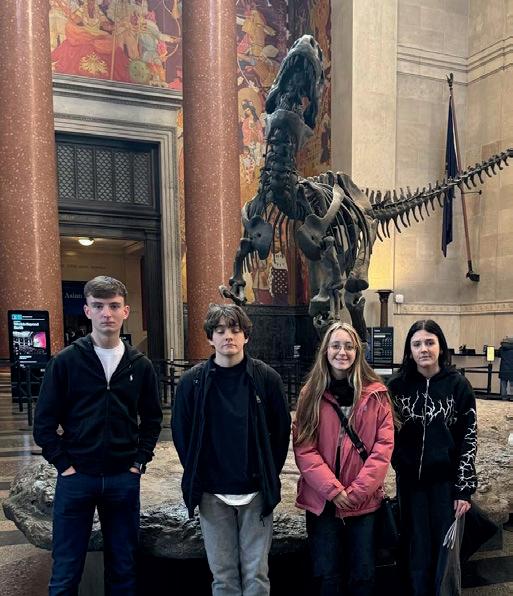
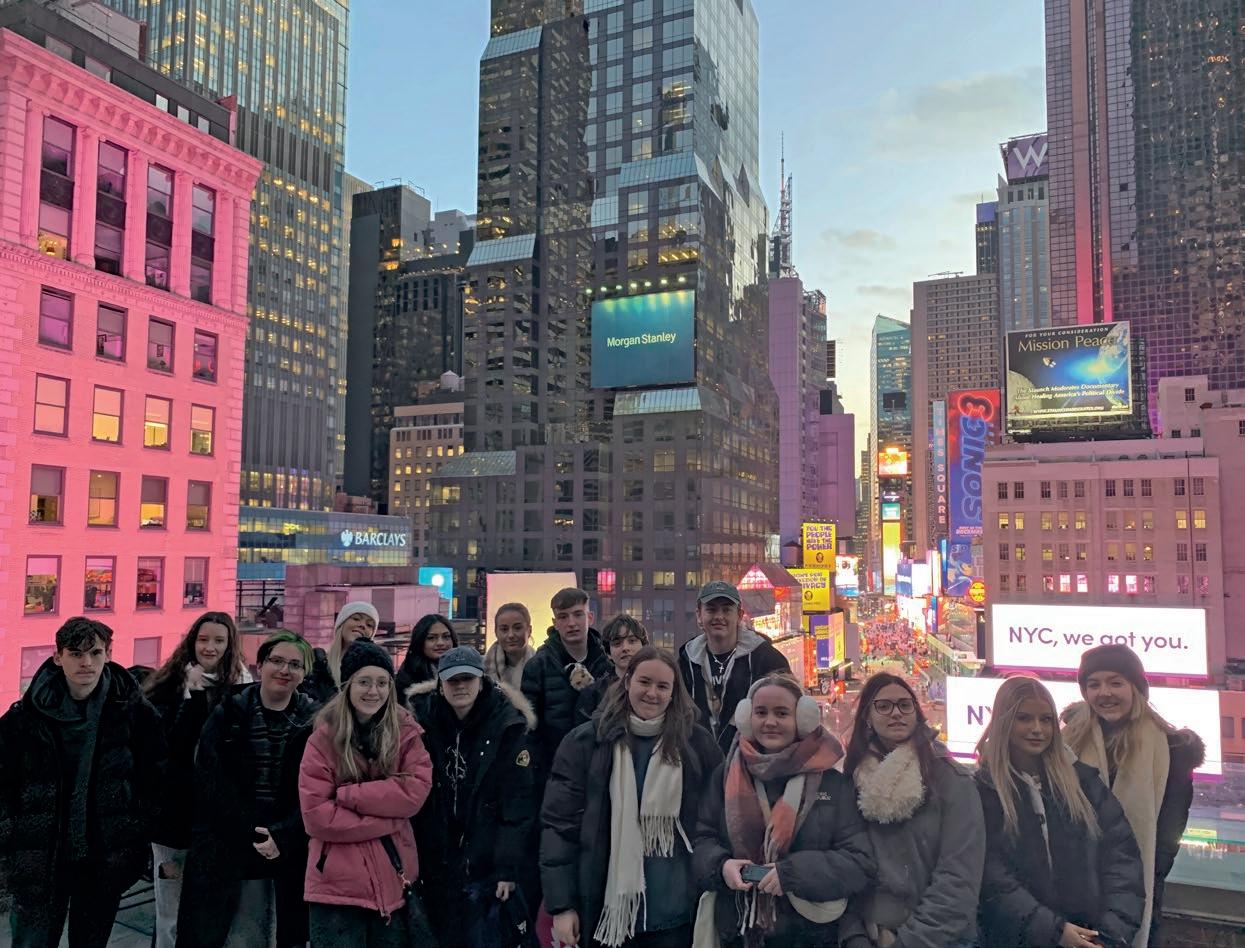

Biology is the study of living organisms, covering their structure, function, growth, evolution, and interactions with the environment.
What you’ll learn in your first year:
PRACTICAL SKILLS: Learn to plan experiments, record results, analyse data, and draw conclusions - skills assessed throughout the course.
FOUNDATIONS OF BIOLOGY: Understand cell structure, molecules, enzymes, and cell division.
EXCHANGE AND TRANSPORT: Study how animals and plants exchange gases and nutrients, focusing on circulatory and transport systems.
BIODIVERSITY AND DISEASE: Explore classification, evolution, natural selection, disease defence, and the importance of biodiversity and conservation.
Advanced Topics in your second year include:
COMMUNICATION AND ENERGY: Learn how organisms respond to changes using nerves and hormones, how they maintain balance (homeostasis), and energy processes like photosynthesis and respiration.
GENETICS AND ECOSYSTEMS: Study inheritance, gene regulation, genetic engineering, and ecological concepts like nutrient cycles and biodiversity.
MICHAEL BENTHAM
Former School: Culcheth High School
Grades:
A* Biology, A* Chemistry, A* Psychology
Progression:
MChem Chemistry -
The University of Manchester
“I am relieved and proud of myself and a lot of lot of hard work has gone into this. College has been amazing, and all my tutors have been wonderful. Studying at the Leigh Campus has really benefitted me a lot as it’s a close-knit campus.”
• Biochemistry
• Biological Sciences
• Biomedical Sciences
• Biotechnology
• Ecology and Environmental
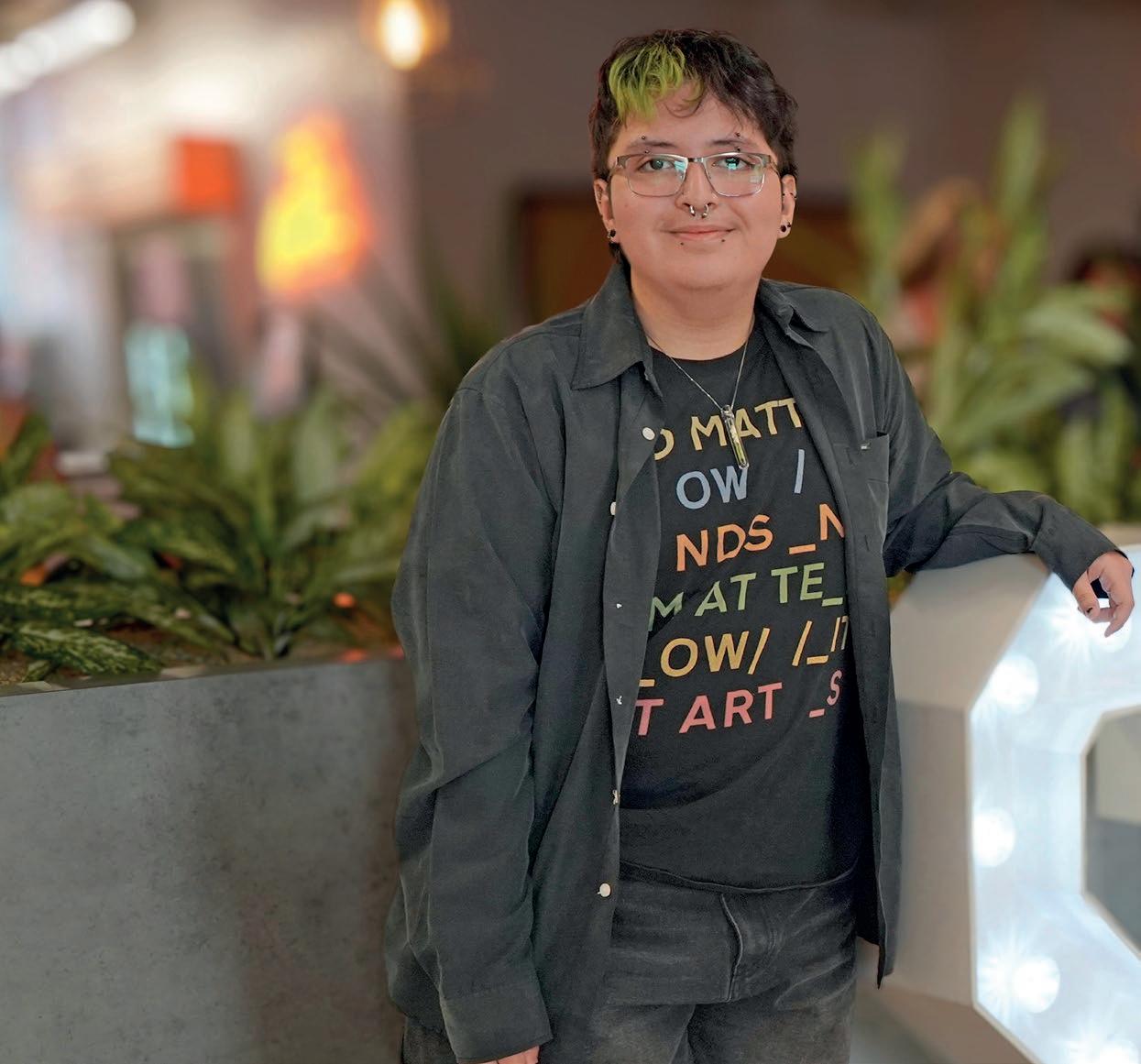
• Genetics
• Marine Biology
• Medicine
• Microbiology
• Palaeontology
• Physiology
• Academic and Industrial Research
• Agriculture and Food Science
• Biotechnology and Pharmaceutical Industries
• Conservation and Environmental Management
• Education and Outreach
• Forensic Science
• Medical and Healthcare Professions
You’ll need a minimum of 5 GCSE subjects graded 9-5 including English and 2 GCSE subjects graded 9-6 including Maths and Combined Science / Biology
As part of your Academic Development Day you’ll connect with working scientists over a text-based chat in the nationwide event, I’M A SCIENTIST: Get Me Out Of Here! You’ll learn about a range of careers and scientists’ different academic journeys. It’s an opportunity to meet in a neutral and friendly setting, to ask about research, studying, topics of interest, and current science news.

You’ll learn how businesses run, covering goals and strategy, external factors like the economy and tech, marketing, operations, HR, finance, global trade, digital tools, mergers, managing change, and types of business ownership.
IN YEAR ONE: You’ll learn how businesses succeed, how entrepreneurs turn ideas into reality, and how companies set goals. You’ll also study marketing, finance, operations, and HR through real examples, while understanding outside influences like competition and the economy.
IN YOUR SECOND YEAR: You’ll delve deeper into strategic decision making by exploring how big business decisions are made - like entering new markets or handling crises. Learn how managers create strategies, assess risks, and compare business success across industries.
SKILLS YOU’LL GAIN: Develop data analysis, decision-making, problem-solving, and commercial awareness - key skills for university or work. Whether you want to start or run a business, this course gives you a strong foundation
• Accounting
• Business and Marketing
• Business Management
• Events Management
• Finance
• Hospitality and Tourism
• Human Resources and Management
• International Business Management
• Retail and Merchandising
• Accountant
• Bank Manager
• Business Analyst
• Business Consultant
• Business Owner (Entrepreneur)
• Business Development Manager
• Cost Analyst
• Estate Agent
• Event Manager and Organiser
• Human Resources Manager
• Investor
• Marketing Executive
• Project Manager
• Recruitment Consultant
You’ll need a minimum of 5 GCSE subjects graded 9-5 including English and Maths.
As part of your Academic Development Day, you’ll hear guest speakers from:
• Bank of England
• Santander
• HSBC
• Fedora Investment Company

Chemistry is the study of matter, it bridges the gap between the intricate biological processes we observe in living organisms, and the unique behaviour of molecules at the quantum level.
What you’ll study:
FOUNDATIONS IN CHEMISTRY: Learn the basics: atomic structure, bonding, equations, and key lab skills that support the rest of the course.
PERIODIC TABLE & ENERGY: Explore trends across the periodic table, group chemistry, and transition metals. Study energy changes, reaction rates, and equilibria.
CORE ORGANIC CHEMISTRY: Dive into carbon-based compounds like alcohols and alkenes and learn about reaction mechanisms and isomerism.
PHYSICAL CHEMISTRY & TRANSITION ELEMENTS: Go deeper into rates, pH, equilibria, and the colourful, reactive world of transition metals.
ORGANIC CHEMISTRY & ANALYSIS: Study aromatic compounds, acids, and amines, and use techniques like infrared spectroscopy and nuclear magnetic resonance to identify unknowns.
PRACTICAL SKILLS: Complete at least 12 practical tasks to build strong lab skills for university or science careers.
This course is available at both Wigan and Leigh Campuses.

• Chemistry
• Biochemistry
• Chemical Engineering
• Forensic Science
• Pharmacology and Pharmaceutical Science
Chemistry is also a strict requirement for most courses in:
• Medicine
• Veterinary Science
• Dentistry
• Synthetic Chemical Industry
• Medicine
• Veterinary
• Dentistry

• Drug Design
• Materials Engineering
• Renewable Energy
• Forensics
• Food Science
You’ll need a minimum of 5 GCSE subjects graded 9-5 including English and 2 GCSE subjects graded 9-6 including Maths and Combined Science / Chemistry.
As part of your Academic Development Day you’ll broaden your understanding of higher education and employment prospects in STEM. We’ll support you to enter competitions, such as the Cambridge Chemistry Olympiad, to become familiar with fields of chemistry beyond the A Level curriculum, and enhance your UCAS applications.

In your first year you’ll delve into:
PROGRAMMING FUNDAMENTALS: Learn to write and understand code, including the use of variables, loops, functions, and data types.
DATA STRUCTURES: Develop systematic approaches to solving computing problems and designing software.
THEORY OF COMPUTATION: Explore how computers solve problems, including algorithms and logic.
DATA REPRESENTATION: Discover how numbers, text, images and sound are represented inside a computer.
COMPUTER SYSTEMS: Learn about hardware, software, operating systems, and how they interact.
COMPUTER ARCHITECTURE: Understand how CPUs work, including the fetch-execute cycle and memory.
ETHICAL AND LEGAL IMPACTS: Explore the social, ethical and legal implications of computing.
NETWORKING BASICS: Study how computers communicate via networks and the internet.
In your second year you’ll take a closer look at:
ADVANCED PROGRAMMING: Dive into object-oriented and functional programming techniques.
ALGORITHMS: Learn, trace, and evaluate complex algorithms like Dijkstra’s and sorting/searching methods.
BIG DATA AND DATABASES: Understand database systems and how large data sets are processed.
SOFTWARE ENGINEERING PRINCIPLES: Apply software lifecycle stages including design, testing and evaluation.
COMPUTATIONAL THINKING: Enhance skills in abstraction, decomposition, and automation.
NON-EXAM ASSESSMENT (PROJECT): Design and develop your own software solution to a real-world problem.
• Computer Science
• Information Systems
• Software Engineering
• Artificial Intelligence
• Health Informatics
• Business Technology
• Data Analyst
• Cyber Security
• Games Developer
• Software Engineer
• Web Developer
• UX Designer
You’ll need a minimum of 5 GCSE subjects graded 9-5 including English and 2 GCSE subjects graded 9-6 including Maths.

As part of your Academic Development Day you could help local businesses develop their online presence and take trips to places like arcades and museums, to find out more about computing outside the classroom environment.
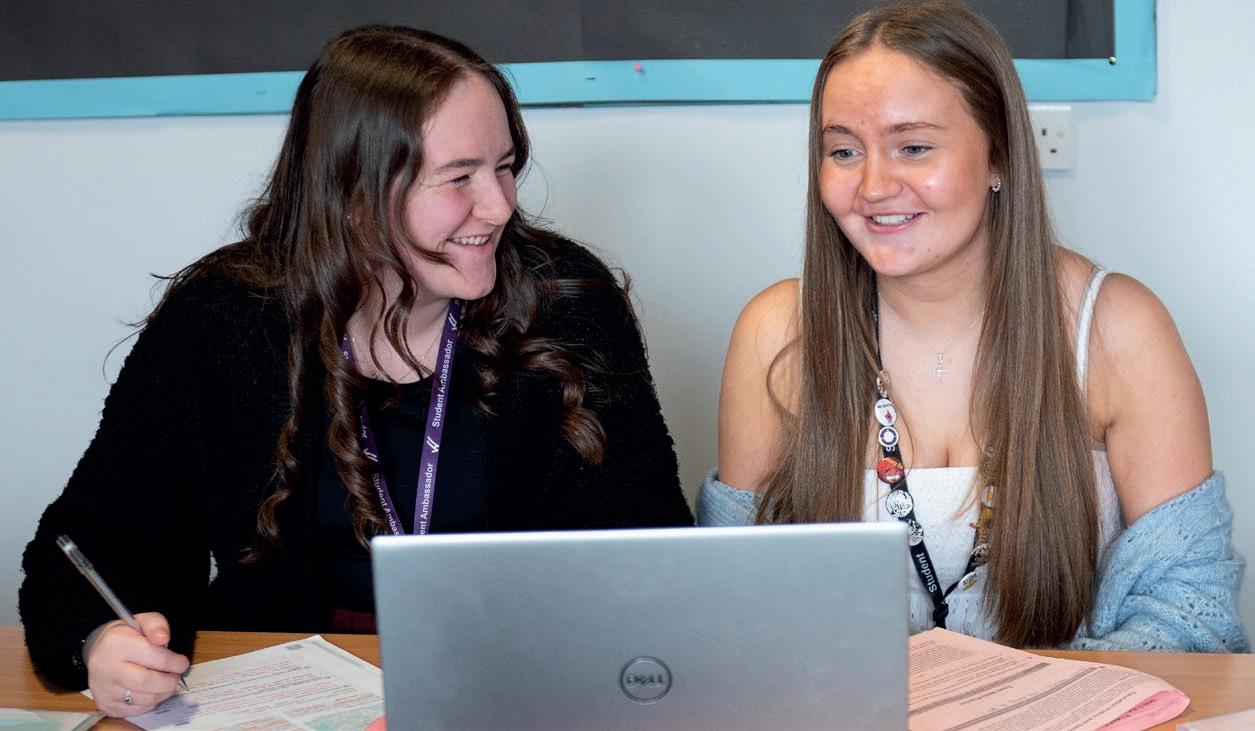
Economics is all about understanding the choices people, businesses, and governments make - and how those choices affect everything from your daily life to global events. If you’re interested in making a difference in the world, business, or politicseconomics gives you the tools to do it.
What You’ll Learn:
REAL-WORLD DATA SKILLS: You’ll develop analytical and quantitative skills working with actual data like inflation, unemployment, and GDP.
MICROECONOMICS: You’ll look at how individuals and businesses make decisions. You’ll explore markets like housing and commodities, learn how supply and demand work, and look at how businesses manage costs, set prices, and make a profit.
MACROECONOMICS: You’ll look at big issues like high inflation, unemployment, and trade deficits, and learn how governments try to fix them using things like taxes, interest rates, and policies to boost the economy.
Take a deeper look into topics including inflation, employment, unemployment, economic growth, aggregate demand, aggregate supply, national income, volume of imports and exports, international trade, globalisation, commercial banks and investment banks, and financial markets.
• Behavioural Economics
• Economics
• Econometrics
• Economics and Finance
• Economics for Business
• Economics with Politics
• Politics and Philosophy
• Accountant
• Business Consultant
• Charity & Development Advisor
• Corporate Lawyer
• Data Engineer
• Financial Bank Manager
• Government Policy Advisor
• Intelligence Analyst
• Marketing and Customer Insight Analyst
• Risk and Investment Analyst
• Stock Market Trader
• Teacher
You’ll need a minimum of 5 GCSE subjects graded 9-5 including English and Maths. 2 GCSE subjects graded 9-6 (one in an essay-based subject).
As part of your Academic Development Day you’ll hear from guest speakers from:
• Bank of England
• Santander
• HSBC
• Fedora Investment Company

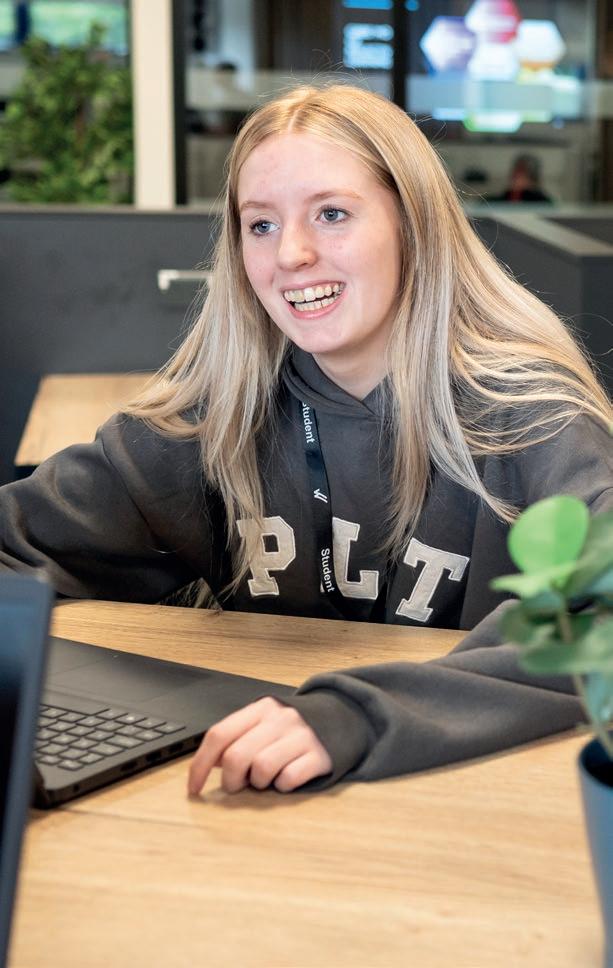
If you love reading, writing, or both then this course is for you.
TELLING STORIES: Explore how stories are told - and why they matter - through fiction, non-fiction, and poetry. From the vibrancy and diversity of Paris to the lasting impact of The Handmaid’s Tale, and the emotional power of poetry, you’ll discover how writers connect with their audiences.
EXPLORING CONFLICT: Examine how people clash with each other and society. Step into 1920s New York in The Great Gatsby and write your own Jazz Age piece. Then explore relationships and identity in 1940s America with A Streetcar Named Desire
MAKING CONNECTIONS: Choose your own area of interest for coursework (worth 20% of your grade). You’ll compare fiction and non-fiction texts - including podcasts, dialogue, journalism, memoirs, or autobiographies - to explore themes that matter to you.
ASSESSMENT: You’ll sit two open-book exams (texts provided to you in exams) at the end of the course, plus complete one independent coursework project worth 20% of your final grade.
• Business
• Creative writing
• English
• History
Journalism
Languages
Law
Literature • Marketing
Social Sciences • Teaching
Theatre
You’ll develop the critical, creative and analytical skills for careers in media, advertising, law, retail and leisure as well as others:
• Author
• Copywriter
• Editor
• Freelance Writer
• Journalist
• Lawyer
• Librarian
• Marketing Executive
• Museum Curator
• PR Manager
• Publisher
• Social Media Manager
• Teacher
• Web Editor
You’ll need a minimum of 5 GCSE subjects graded 9-5 including Maths and 2 GCSE subjects graded 9-6, including English or an essay based subject such as History.
As part of your Academic Development Day you’ll benefit from a range of extra qualifications, work placements, voluntary work and masterclasses, delivered by industry experts. You’ll visit the theatre, the Bronte Parsonage at Haworth, and libraries for poetry readings, guest talks and workshops from local and national authors. Plus you could become a blog writer and get published right from the start of your course.
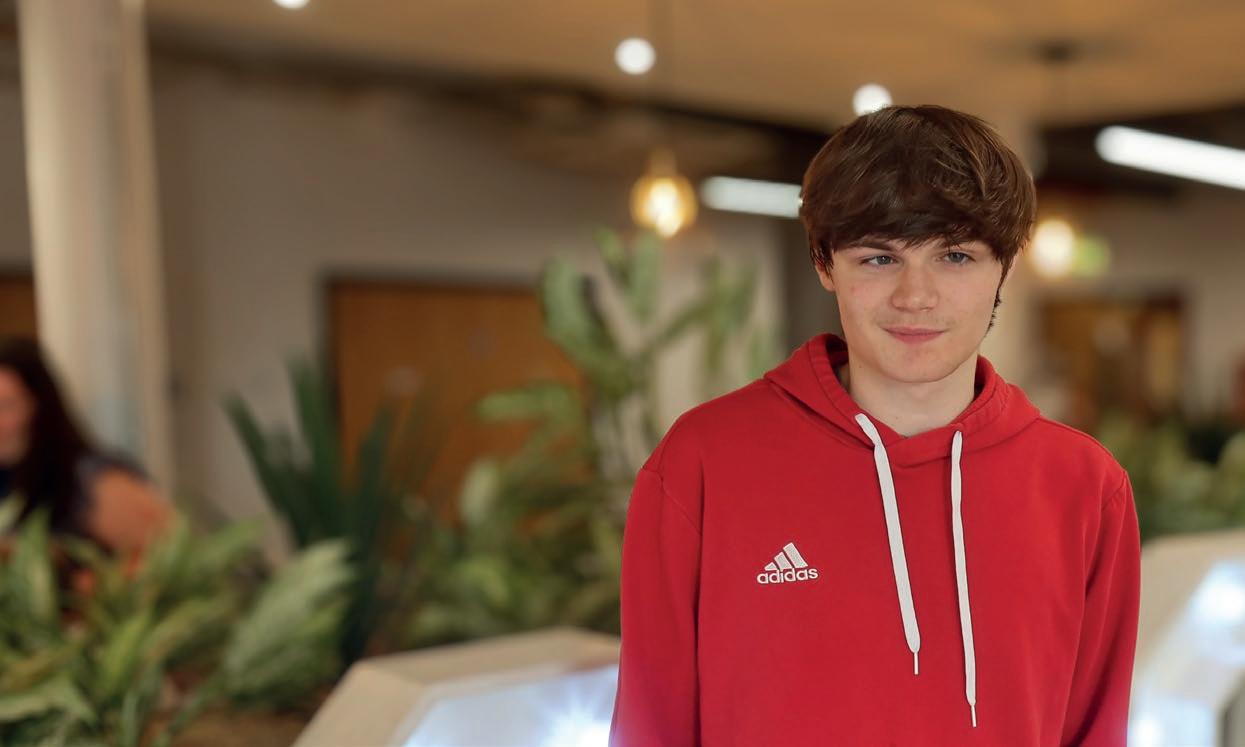
Former School: The Prescot School
Grades:
B Sociology, B English Combined,
B BTEC Level 3 Extended Diploma in Criminology
Progression:
BA (Hons) Creative and Professional WritingUniversity of Westminster
"The tutors are absolutely lovely, there’s a lot of support and you can always message them and get a response.
“We went on lots of interesting trips including museums and the Shakespeare Theatre in London. We also had some fascinating talks from crime investigators in my criminology
A Level.”

If you love fiction, poetry, or both, then A Level English Literature is the subject for you.
PROSE: You’ll explore stories that feel both imagined and real. If you’ve ever felt trapped, unheard, or wondered how power can corrupt society, you’ll connect with our core texts: Rebecca, Jane Eyre, and The Handmaid’s Tale. You’ll also study a wide range of novel extracts from different genres and literary traditions.
PLAYS: Theatre, from its roots in storytelling and poetry, remains a powerful art form. We study Othello and Translations, focusing on themes like identity, politics, and relationships. You’ll examine how these plays work on stage and why their cultural impact lasts.
POETRY: You’ll explore poems about love from different styles since 1900, including modernist, traditional, post-modernist, and confessional works. You’ll also study the contemporary collection Skirrid Hill by Owen Sheers. Using a historical approach, you’ll deepen your understanding and develop your critical thinking skills.
ASSESSMENT: Most exams are ‘open book’, so you can use texts during tests. Your interpretation matters more than memorising quotes, and our classes help you develop your own ideas. Plus, you’ll complete a 20% independent coursework project, choosing any two texts you want - no fixed list - so you can explore what interests you most.
This course is available at both Wigan and Leigh Campuses.
You’ll leave with an understanding of essential critical, creative and analytical skills for progression to higher education.
• Business
• Creative writing
• English
• History
• Journalism
• Languages
• Law
• Literature
• Marketing
• Social Sciences
• Teaching
• Theatre
• Author
• Copywriter
• Editor
• Freelance Writer
• Journalist
• Lawyer
• Librarian
• Marketing Executive
• Museum Curator
• PR Manager
• Publisher
• Social Media Manager
• Teacher
• Web Editor
Former School: St Joseph's RC High School
Grades:
A English Literature, B Sociology, C Psychology
Progression:
BSc (Hons) Criminal Justice - Edge Hill University
“After coming to an open evening and speaking to the tutors, I decided that A Levels were right for me.
"I like how much we learn about the world in general as part of the sociology course, and in English Literature I love all the reading we get to do; and we also had a trip to see Othello at the Globe Theatre which was great.”
You’ll need a minimum of 5 GCSE subjects graded 9-5 including Maths and 2 GCSE subjects graded 9-6, including English, or an essay based subject such as History.
As part of your Academic Development Day you can take up extra qualifications, work placements, voluntary work and masterclasses. You’ll visit the theatre, the Bronte Parsonage at Haworth, and libraries for poetry readings, guest talks and workshops from local and national authors.
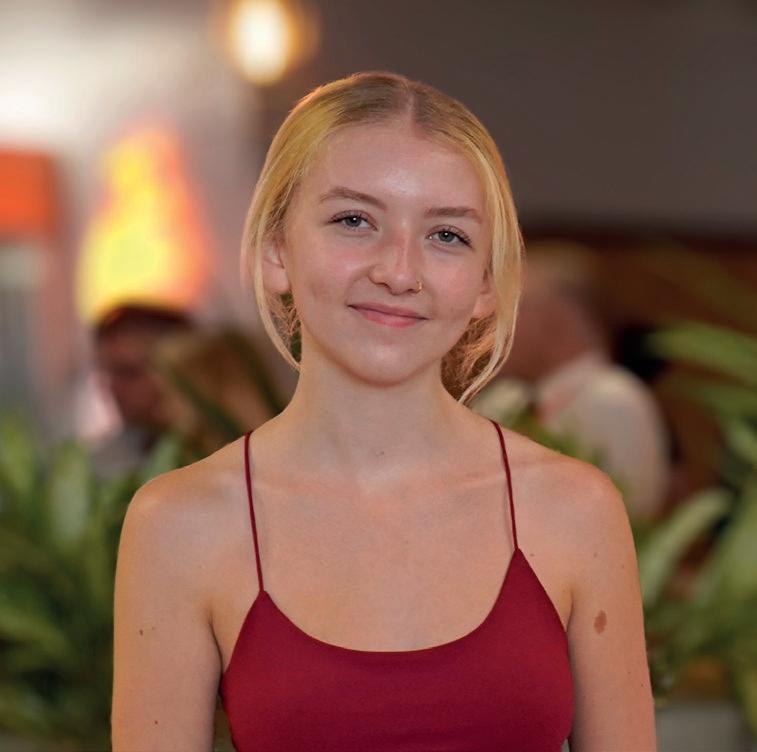

You’ll develop artistic skills, creativity, critical thinking, and knowledge of the art world, producing your own creative work, while studying that of artists and art movements.
PRACTICAL STUDIO WORK: You’ll spend time in the studio, exploring various media, techniques, and processes. You’ll create artwork in response to a series of projects, developing skills and expressing your ideas visually.
INVESTIGATING AND EXPERIMENTING: You’ll research, explore, and experiment with different materials, styles, and approaches. You’ll investigate the work of artists and explore new artistic concepts and themes.
CRITICAL AND CONTEXTUAL STUDIES: Study the work of different artists, art movements and historical and contemporary art contexts. Learn how to analyse and critically evaluate artworks, discussing their influences and significance.
PERSONAL INVESTIGATION: In the second year, you’ll do a personal investigation with in-depth research and exploration of a chosen topic or theme. You’ll produce a body of artwork with a written component that explains your creative process and contextualises your work.
• Animation
• Architecture
• Art Education
• Art History
• Art Therapy
• Creative Writing
• Fashion Design
• Fine Arts
• Graphic Design
• Interior Design
• Illustration
• Photography
• Web Design
A minimum of 5 GCSE subjects graded 9-5 including English, Maths and an art based subject and 2 GCSE subjects graded 9-6.
You’ll visit galleries in Manchester, Liverpool and London, as well as Yorkshire Sculpture Park.

WHAT CAREERS COULD I GET INTO?
• Animator
• Art Critic/Journalist
• Art Conservation /Restoration
• Art Director
• Art Teacher/ Art Educator
• Art Therapist
• Curator/Museum Professional
• Fine Artist
• Graphic Designer
• Illustrator
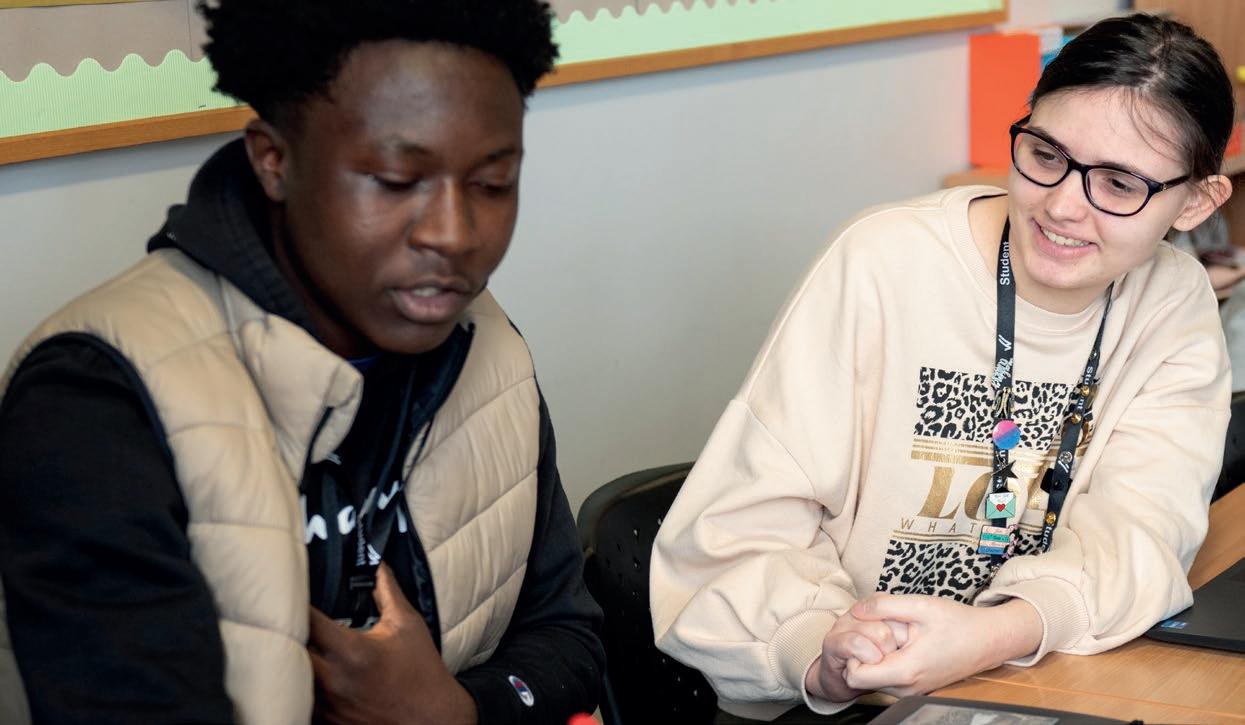
You’ll evaluate significant historic periods and develop an understanding of what has gone before to prepare for the future.
Plus, you’ll develop academically and personally, becoming an analytical, evaluative and a well-rounded learner.
BRITAIN - INDUSTRIALISATION AND THE PEOPLE 1783-1885:
Dive into the Industrial Revolution, a time when Britain changed forever. Explore the growth of industrial cities, the tough conditions workers and families faced, and the early fights for political rights and reforms. Discover the struggles of factory workers, the Chartist movement, and trade unions that helped shape today’s society.
GERMANY - DEMOCRACY AND NAZISM 1918-1945:
Learn about the chaos in Germany after WWIeconomic problems, political unrest, and social conflict - that allowed Hitler’s rise. Understand how propaganda, fear, and strict control shaped daily life under the Nazis. Study the impact of their policies, including the persecution of minorities and how totalitarian rule led to WWII.
COURSEWORK: In your second year, you’ll complete an independent research project on a history topic that interests you. This is a chance to work with real sources which will help you build skills in critical thinking, analysis, and evidence evaluation, while creating your own historical argument.
This course is available at both Wigan and Leigh Campuses.
• Business
• History
• Humanities Subjects
• Journalism
• Law
• Politics
• Academia / Education
• Finance
• Journalism
• Law
• Local / National Government
• Publishing
• Research
You’ll need a minimum of 5 GCSE subjects graded 9-5 including English and Maths and 2 GCSE subjects graded 9-6, including an essay based subject such as History.
You’ll hear from an archives guest speaker, have visits from the Holocaust Educational Trust Lessons from Auschwitz Project with talks from a holocaust survivor, plus you’ll go on UCAS and university trips.
Former School: Dean Trust Rose Bridge
Grades:
B English Literature, B History, C Sociology
Progression:
LLB (Hons) Law - Lancaster University
“I chose my A Level subjects as they were a good fit towards a career in law. Getting the opportunity to do a Bar Mock Trial was very good. I found it really interesting, and it helped cement what I wanted to do at uni.”
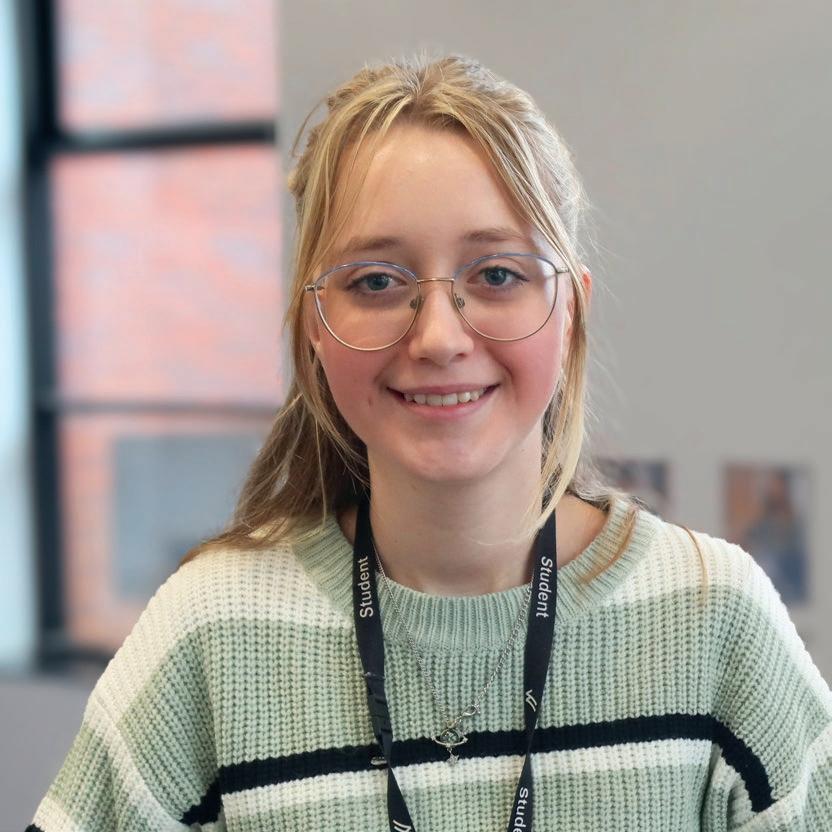

A Level Maths builds strong problem-solving and analytical skills useful in many careers and subjects like engineering, physics, economics, and computer science.
You’ll learn:
PURE MATHS: which covers core topics like algebra, trigonometry, calculus, and geometry, helping you develop logical thinking and problem-solving.
STATISTICS: teaches you how to collect and analyse data, with topics like probability and hypothesis testing, so you can understand and predict real-world trends.
MECHANICS: uses maths to explain motion and forces, covering things like Newton’s laws and kinematics - key for understanding how things move.
This course is available at both Wigan and Leigh Campuses.
• Accountancy
• Computer Science
• Economics
• Engineering
• Mathematics
• Statistics
• Astronomer
• Accountant
• Data Analyst
• Financial Analyst
• Investment Analyst
• Research Scientist
• Statistician
• Teacher
A minimum of 5 GCSE subjects graded 9-5 including English and 2 GCSE subjects graded 9-6, including Maths.
As part of your Academic Development Day you’ll take masterclasses with industry experts, such as Ford France and BAE Systems. You can test yourself at UKMT Senior Mathematics Challenge.
Plus you can benefit from the University of Manchester support sessions and the college’s Mathematics lunchtime club.

Former School: Atherton High School
Grades:
B Business, A Economics, A Mathematics
Progression:
BSc (Hons) Accounting and FinanceEdge Hill University
“Hard work pays off, I am thrilled to receive my A,A,B and excited to go to university. I am happy with my decision to study at Wigan and Leigh because of the small class sizes, it has helped me thrive. I am ready to take on my next adventure.”

If you love TV, magazines, and news, and want to understand how they impact society and culture, this subject is for you.
You’ll learn to think critically about all kinds of media, past and present.
MEDIA LANGUAGE & REPRESENTATION: Learn how media uses words, images, and techniques to shape meaning and portray people, events, and issueschallenging or reinforcing stereotypes and values.
MEDIA INDUSTRIES & AUDIENCES: Discover how films, ads, games, podcasts, and news are made and funded. Explore how audiences are targeted - and how they shape media in the digital age.
TV IN THE GLOBAL AGE: Study Black Mirror and Les Revenants to see how global TV uses media techniques and tackles representation. Understand how global industries and viewers interact.
MAGAZINES & ALTERNATIVE MEDIA: Compare Vogue and The Big Issue to explore mainstream vs. independent publishing and how they influence audiences and culture.
MEDIA IN THE ONLINE AGE: Explore how digital media changes content, identity, and audiences. Study online creators like KSI and platforms like Attitude magazine’s website.
COURSEWORK: Bring your creative ideas to life by producing a media piece - like a magazine, short film, podcast, or website - using pro equipment and staff support.
100% HIGH GRADES
• Cinematics & Photography
• Design
• Film Studies
• Journalism
• Marketing
• Media Studies
• Production Management
• Sociology
• TV Studies
• Audio-Visual Production
• Journalism
• Marketing Profession
• Social Media Management
You’ll need a minimum of 5 GCSE subjects graded 9-5 including English and Maths and 2 GCSE subjects graded 9-6.
You can take part in live studio recordings (including Question of Sport), plus Q&A sessions with writers and directors.
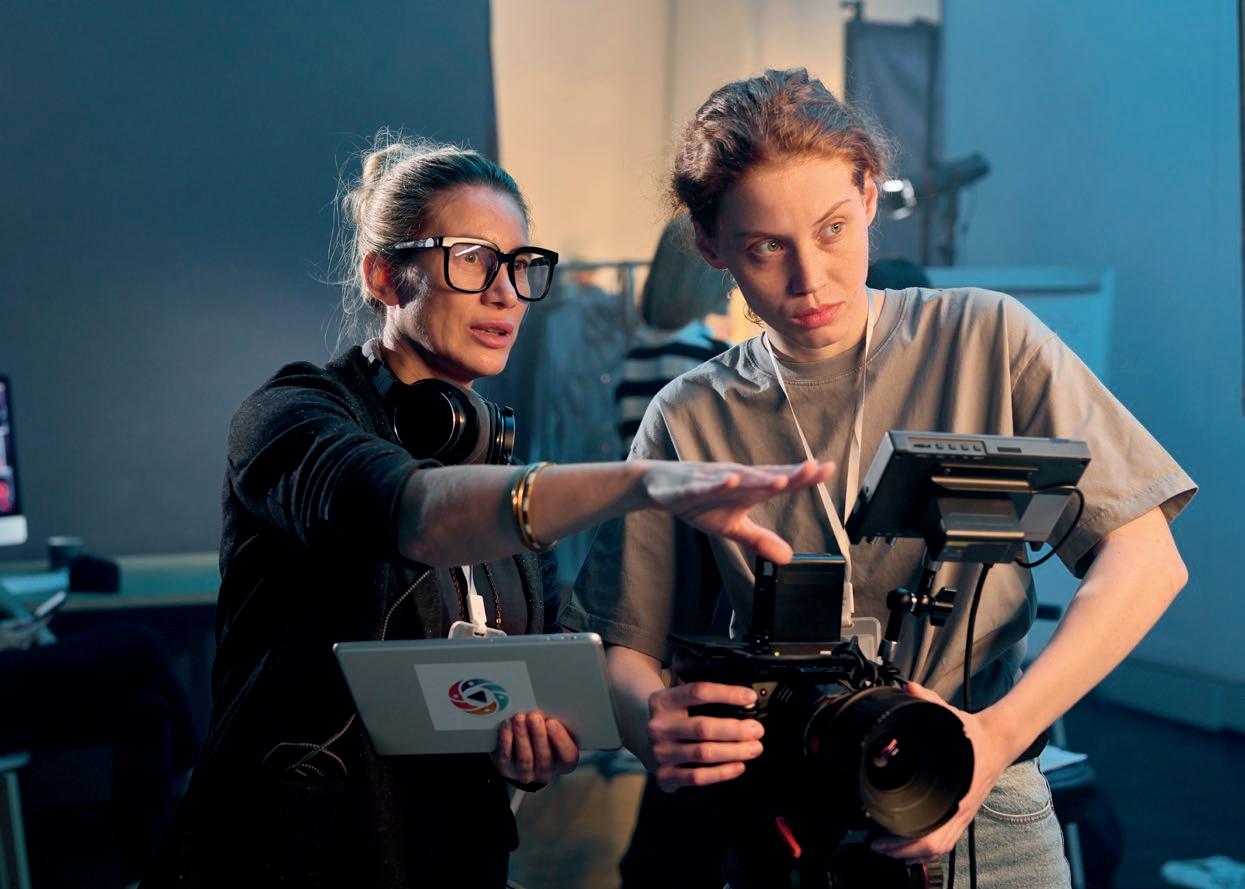
• Media Producing & Directing
• Photography
• Public Relations
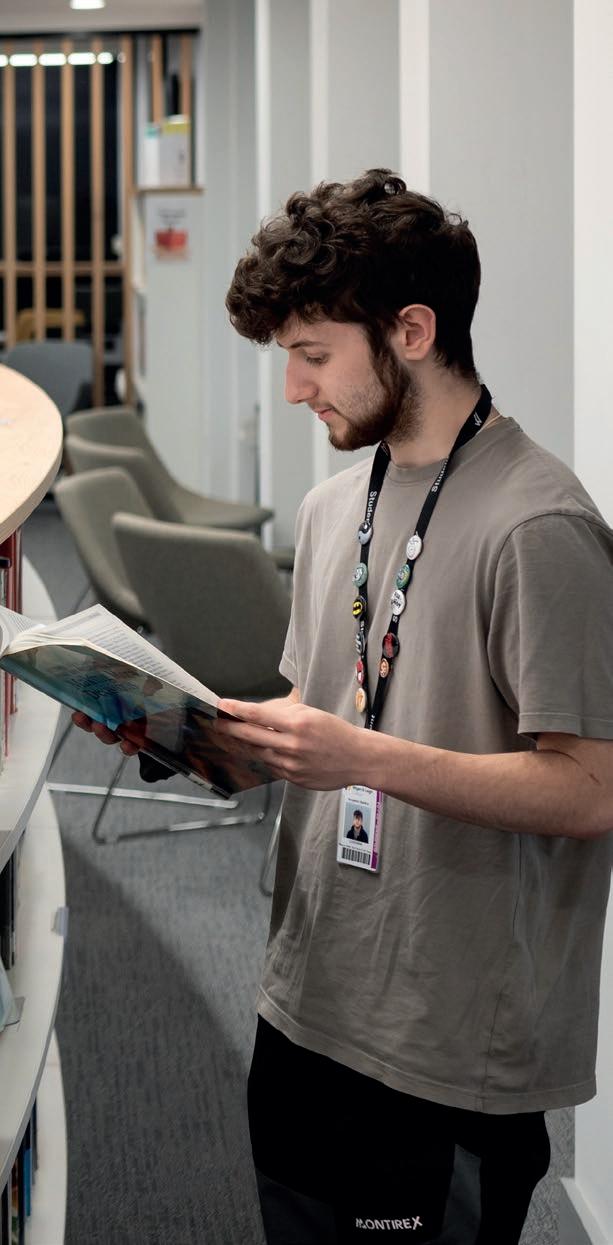
Physics delves into the fascinating and fundamental principles that govern our universe. This course is ideal for aspiring physicists, engineers, and scientists, providing a robust foundation for further academic pursuits and a deeper appreciation of the physical world around us.
What you’ll learn:
MECHANICS: Newton’s laws strengthen your ability to model and predict real-world scenarios - skills valuable in engineering and even safe DIY tasks. You’ll explore momentum and energy conservation, building strong mathematical skills.
ELECTRICITY, CAPACITORS, AND ELECTRIC FIELDS: Reveal how controlling electron motion powers everyday devices. In your second year, electromagnetic induction explains how transformers and electricity generation work - another area rich in practical applications and mathematical exploration.
ASTROPHYSICS, COSMOLOGY, QUANTUM, AND NUCLEAR PHYSICS:
Introduce fascinating concepts you’ve likely heard of but want to understand more deeply. You’ll apply Einstein’s famous equation E = mc² to learn how mass and energy relate, especially in nuclear power.
GRAVITATION, CIRCULAR MOTION, AND OSCILLATIONS: Help model systems like fairground rides, planetary orbits, and skyscrapers - reducing resonance risks. You’ll also study all three of Kepler’s laws.
MEDICAL IMAGING: Ties together quantum topics across both years, focusing on technologies like X-rays, PET scans, and CT scanners.
• Accountancy
• Aerospace Engineering
• Geology
• Law
• Materials Science
• Medical Biophysics
• Radiography
• Software Engineering
• Medicine
• Natural Sciences
• Particle Physics
• Physics with Astrophysics
• Physics with Medical Physics
• Pure Physics
Most engineering careers require physics, such as Aerospace, Mechanical and Civil Engineering. You may also need physics for careers in medicine. Other careers include:
• Data Scientist
• Environmental Careers
• Geophysicist
• Law
• Medical Physicist
• Radiologist
• Medicine
• Optometry
• Pharmacology
• Nuclear Physicist
• Research Physicist
• Teaching
• Academia
You’ll need a minimum of 5 GCSE subjects graded 9-5 including English and 2 GCSE subjects graded 9-6 including Maths and Combined Science / Physics.
We’ll support you if you want to enter the British Physics Olympiad competition, to challenge yourself and channel your enthusiasm for the subject.
Former School: Harper Green School
Grades: A* Chemistry, A Mathematics, A* Physics
Progression:
BSc (Hons) Physics with AstrophysicsUniversity of Manchester
“I chose to come here as I could see how much the staff cared about the subject they teach - it made me want to come here and do as well as I can.
“I like that on each course the tutors go much deeper to further our knowledge and tailor it towards our interests
- I really appreciate knowing how things work and how they apply to the world.”

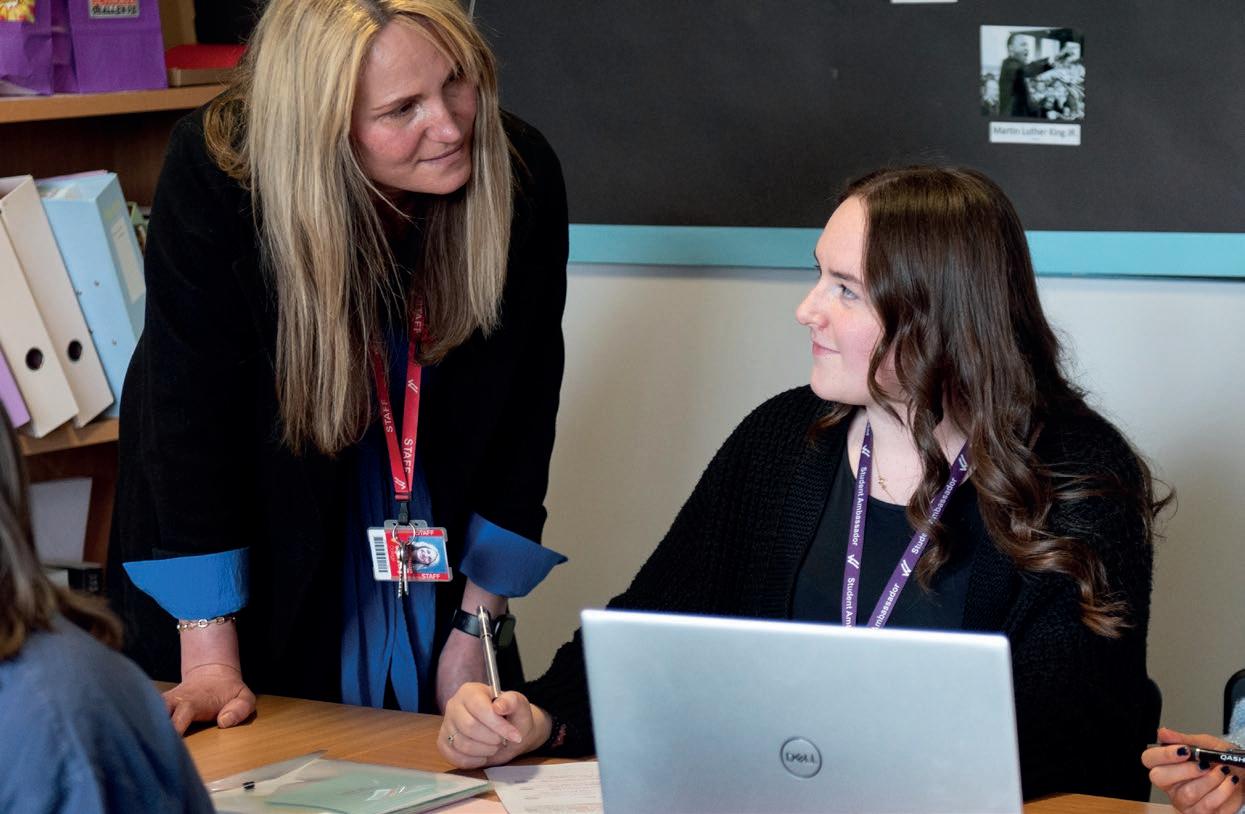
BRITISH POLITICS & IDEOLOGIES: You’ll explore who truly holds power in the UK - Parliament, the people, or pressure groups. Examine what shapes voting behaviour, including class, media, and social movements. Study key political ideologies - Liberalism, Conservatism, and Socialism - and how they’ve evolved to influence modern Britain.
UK GOVERNMENT & OPTIONAL IDEOLOGY: Take a deeper look at how the UK is governed: the role of Parliament, the Prime Minister, the courts, and how rights and the constitution are changing. You’ll also explore Anarchism - a radical ideology that challenges conventional views on power and society.
US GOVERNMENT: Compare UK and US politics by studying presidential power, unique aspects of US elections, and civil rights protections.
YOU’LL GAIN: A Level Politics builds your critical thinking, debate, and analytical writing skills. You’ll gain a strong grasp of current affairs and the confidence to present and challenge ideas - in class, at university, or even at the dinner table.
Former School: The Westleigh School
Grades: C History, B Politics, C Sociology
Progression:
BA (Hons) History and PoliticsEdge Hill University
“The classes are quite small, so you get a good close relationship with the tutorsthey always have time for us. I also really enjoy my history subject as it’s really interesting and they put a lot of detail into the learning which is helpful.”
• Politics
• Politics, Philosophy and Economics (PPE)
• Law
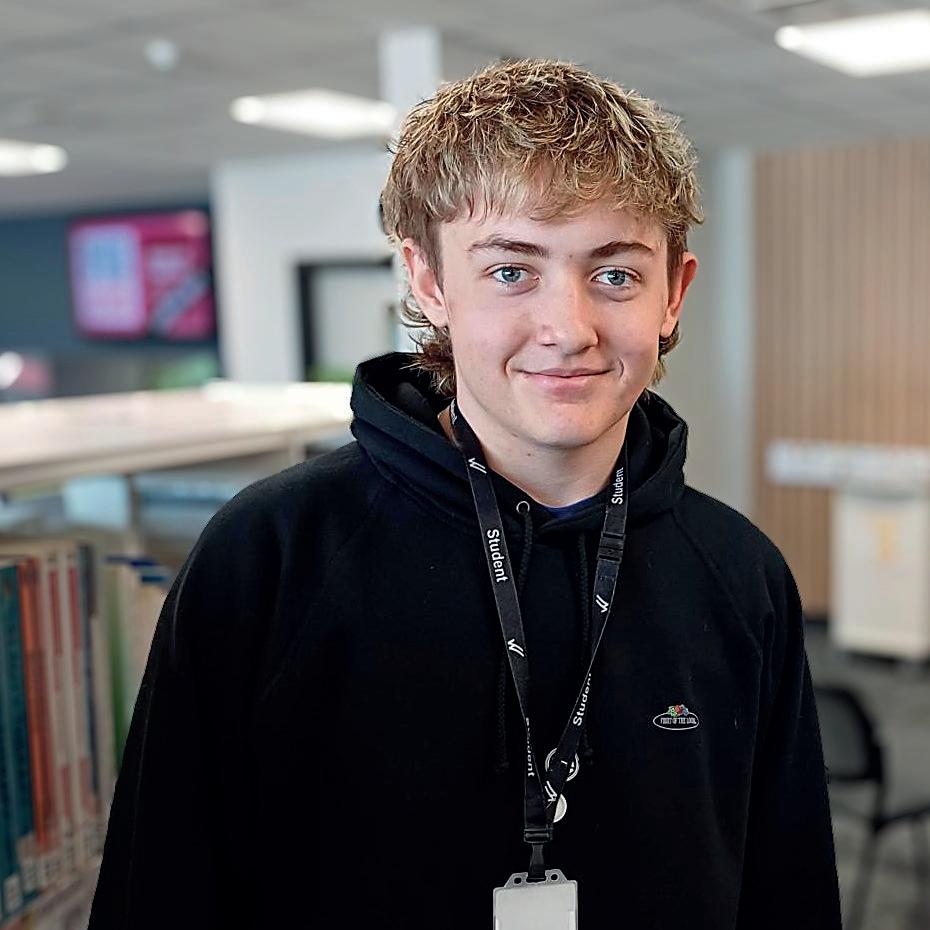
• Journalism
• History
• International Relations
• Finance
• Academia / Education
• Finance
• Journalism
• Law
• Local / National Government
• Publishing
• Research
A minimum of 5 GCSE subjects graded 9-5 including English and Maths. 2 GCSE subjects graded 9-6 (one in an essay-based subject).
You’ll visit the Houses or Parliament, where you’ll meet MPs in and around the different chambers at Westminster Palace.
The scientific study of the mind and behaviour. You’ll gain an understanding of how psychologists conduct research, before examining a wide range of areas within psychology.
COGNITIVE PSYCHOLOGY - MEMORY & EYEWITNESS
TESTIMONY: You’ll learn how memory works and what affects the reliability of eyewitness accounts.
MENTAL HEALTH - CAUSES & TREATMENTS: Study disorders like depression and phobias, their causes, and treatment options.
FORENSIC PSYCHOLOGY - CRIME & REHABILITATION: Examine why people commit crimes and explore methods for prevention and rehabilitation.
RESEARCH METHODS: Gain hands-on skills in designing, conducting, and analysing psychological studies, with a focus on ethics and data interpretation.
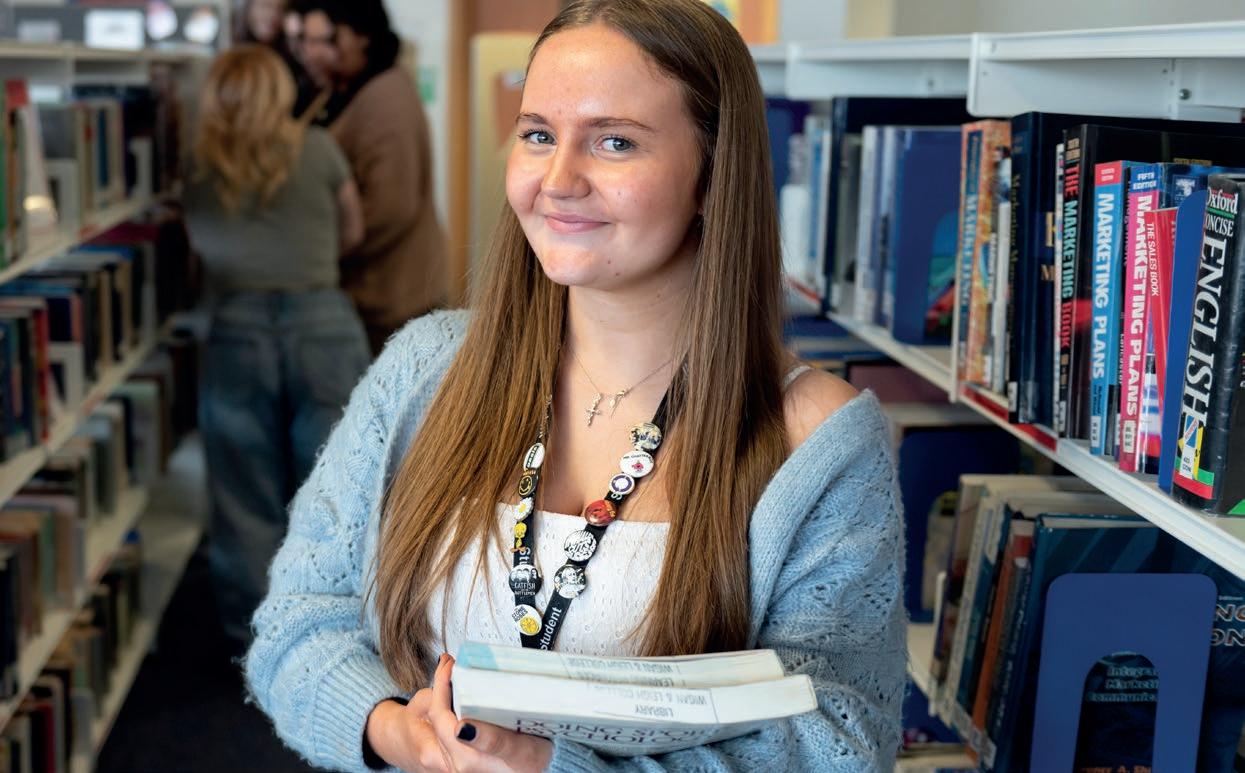
• Child Psychology
• Forensic Science
• Linguistics
• Neuroscience
• Primary Teaching
• Psychology
• Sociology
• Social Work
• Speech and Language Therapy
• Youth Work
• Clinical Psychology
• Forensic Psychology
• Human Resources
• Nursing
• Psychology
• Research & Development
• Social Work
You’ll need a minimum of 5 GCSE subjects graded 9-5 including English and 2 GCSE subjects graded 9-6 including Maths or Science.
As part of your Academic Development Day you’ll go on trips to a moot courtroom, participate in a mock trial, and hear from academics and those who work with domestic abuse survivors at guest talks in college.
Former School: St Joseph's RC High School
Grades: A History, A Sociology, C Psychology
Progression:
BSc (Hons) Forensic PsychologyManchester Metropolitan University
"It made the last two years worth it and I am very relieved with my results. All the teachers are very supportive, and overall I have enjoyed my time here.
"The guest speakers we had really helped me figure out what I want to do in the future."

The study of social life, human behaviour patterns and interactions provides us with a better understanding and reasoning for societal differences.
FAMILIES AND HOUSEHOLDS: You’ll learn about the relationship of the family, as well as the changing roles of men, women and children in modern society. You’ll also examine global changes.
EDUCATION: You’ll study the role of the education system; academic achievement based on class; gender and ethnicity; relationships between students and teachers; labelling and the hidden curriculum.
CRIME AND DEVIANCE: You’ll explore explanations of crime, deviance, social order and social control. Examine globalisation and crime, as well as the different impacts of age, gender, class and ethnicity.
BELIEFS: You’ll investigate ideology, science, NRMS and NAM as well as relationships of different social groups.
RESEARCH METHODS: You’ll examine a wide range of research methods and carry out practical research.
This course is available at both Wigan and Leigh Campuses.
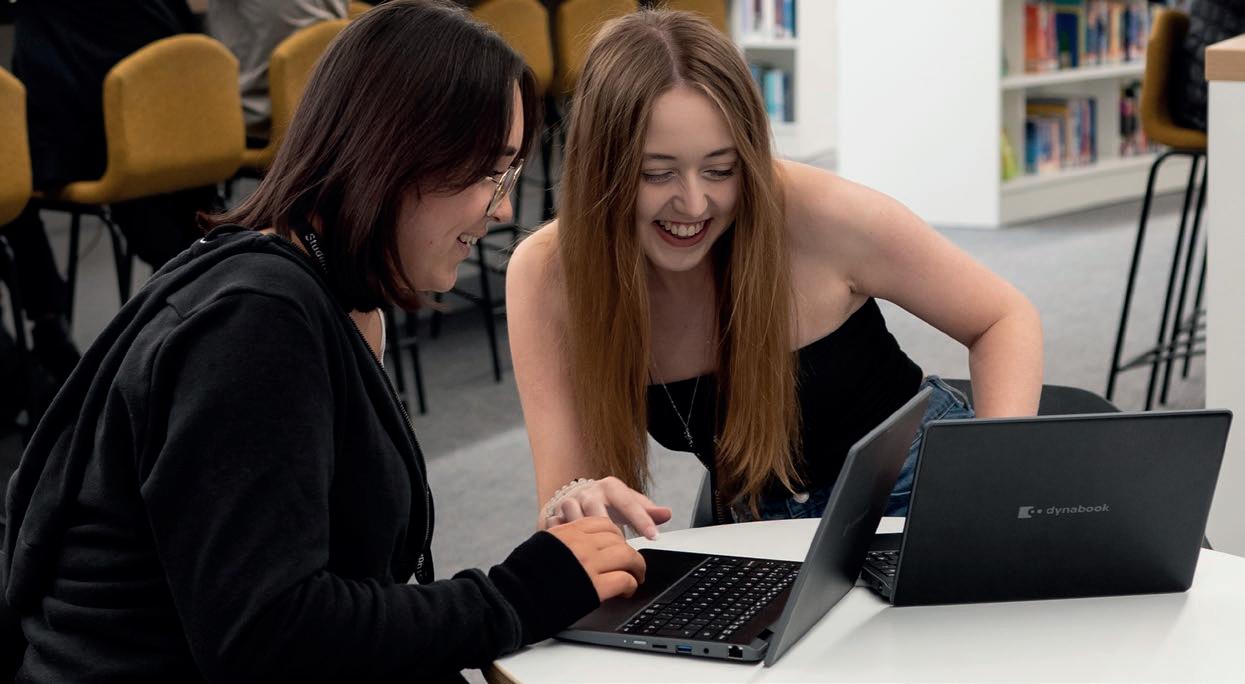
Former School: Fred Longworth High School
Grades: A Criminology, C Psychology, A Sociology
Progression:
Primary Education with QTS - AT Edge Hill University
"I'm very happy with my results - the hard work has paid off.
"As our classes are smaller at Leigh we have had lots of 1-1 support from our tutors, and without them I don’t think I would have got the results I got. I'm very excited to start university as it’s the next path to my career."
• Criminology
• Education
• Health
• Philosophy
• Policy
• Sociology
You’ll need a minimum of 5 GCSE subjects graded 9-5 including English and Maths and 2 GCSE subjects graded 9-6 (one in an essay-based subject).
• Charity Officer
• Market Reseacher
• Police
• Researcher
• Solicitor
• Teacher
As part of your Academic Development Day you’ll go on trips, including a moot courtroom where you’ll take part in a mock trial, and hear guest talks from academics and those who work in Law and Sociology.

Facilities include a clinical ward, manual handling suite, specialist science laboratories and a health and social care careers hub.
The Centre is also home to our virtual reality space the CAVE, where you can become immersed in a scene, or view 360 degree content with other students using wall or floor projections.
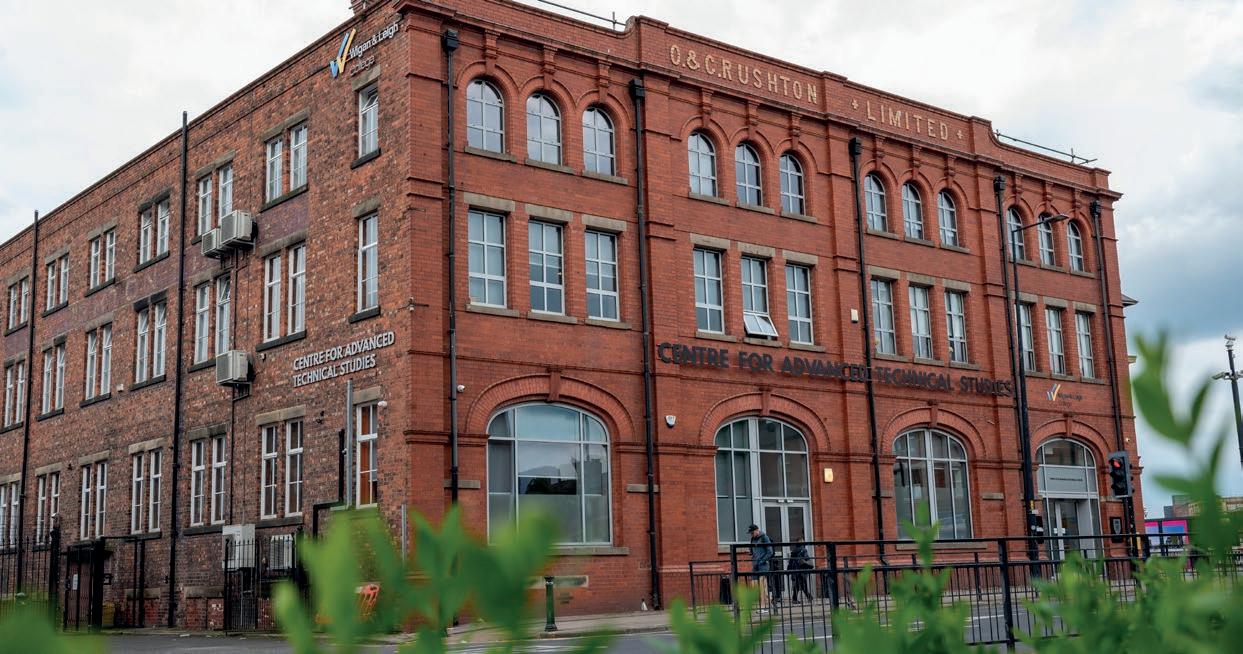

Our main A Level hub is in Wigan town centre. There’s a Learning Resource Centre where you can access physical and digital learning aids and much more. Alongside teaching rooms and the refectory there’s the new Performing Arts Centre with multimedia suites, a green screen and performance theatre.
You’ll enjoy the sixth form experience at the multi-million pound Leigh Sports Village site. You can access new science labs with university standard facilities and equipment. A fully equipped art department is home to A Level Art and our first Digital Academy and Clinical Skills lab are also located here.
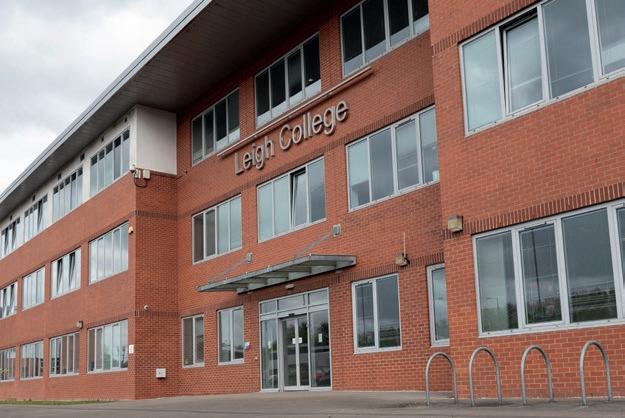
For applicants under the age of 19 on 31 August 2026
This application form is only to be completed if you are not already a student at the college and you wish to apply for A Levels starting in September 2026.
Birth Sex Male Female Pronouns
Last Name Ref (office use)
First Names Date of Birth Age on 31/08/26
Home Address
Postcode
PRESENT OR LAST SCHOOL OR COLLEGE ATTENDED
Mobile
Telephone Email
Have you ever studied at Wigan & Leigh College before? Yes No
Have you been a permanent resident in the UK during the last 3 years? Yes No
SECTION 2 - Tell us which course you would like to study at Wigan & Leigh College
A Levels (a Pathway or specific A Levels) A Level Extended Choices
Where would you like to study? Wigan Leigh
If you are unsure about which course or subject you wish to study, please contact our Admissions Team on 01942 761 111.
Subject (Example: Art)
Do you have:
• A disability (eg visual impairment, hard of hearing, mental health difficulties, epilepsy)
• A learning difficulty (eg dyslexia, dyscalculia)
• A major health condition that may affect your course
If so, please tick this box We will contact you to discuss your support requirements.
SECTION 5 - Declaration
Do you have an Education Health Care Plan (EHCP)?
Yes No
If yes, which local authority is your EHCP from (eg Wigan, Bolton)
The information you provide in this application form will be used to process your application to college and communicate with you for admission to Wigan & Leigh College. Under the General Data Protection Regulations, we will store this information for a period of 12 months after the start date of the course for which you are applying, after which it will be destroyed securely. We will only share this information with your current school and Wigan Council for monitoring and tracking purposes. The information will not be shared with any other third party unless required to do so for legal reasons. By signing this form, you agree to the above.
Applicant signature
Date
If I attend a Wigan borough school, I consent to you accessing my school education record from Wigan Council
If you would like to receive information about the college, future events and courses please tick the appropriate box for how you would like us to keep you informed: phone / text email post
What are your career aspirations? What have you done to support your application (eg voluntary work, sports achievements, work experience)?
If you need assistance with completing your application form please contact our Admissions Team on 01942 761 111.


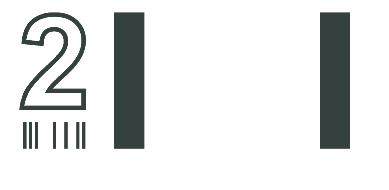
Our team offers impartial advice to help you make decisions about how to get future ready and plan further study options after your course. You can meet us to find out more about:
• How to change course or get an apprenticeship.
• UCAS applications.
• Student Finance applications.
• Applying for higher education at our University Centre.
• Job searches, CVs, letters and job applications.
• Co-ordinating work placements.
• Identifying and building the skills to get ahead.
• Researching and planning to support career ambitions.
• Funding and welfare.
• Support agencies.

We provide experiences to support you to achieve your dream career.
We hold guest speaker sessions from industry experts, visits to workplaces and opportunities to work on employers’ live briefs and projects.
We use up to date labour market information to help you explore careers in your chosen industry, find out more about salary and earnings, growth opportunities and the skills you need to get work ready.
Every A Level student has work experience to get future ready. You’ll find out more about your type of work experience during your induction period.
We’ll help you find a placement and we make sure your workplace is a safe environment to gain an insight into the world of work.
A work placement can help you decide on the careers or industries you want, or don’t want to work in.
It can also help to:
· develop skills for careers
· develop professional behaviour
· discover new talents
· strengthen CVs
· improve industry knowledge
· put learning into practice.
You can book an appointment through the reception team or call:
Parsons Walk Campus 01942 761 681
Pagefield Campus 01942 761 819
Leigh Campus 01942 761 487
You may be eligible for helpif you meet certain criteria and you‘re on a full-time, fully-funded course.
Scan here to find out more
Tear out and complete the application form opposite and return it FREEPOST, drop it into one of our college receptions, or apply online today at wigan-leigh.ac.uk/apply
Once we receive your application form, we’ll send you an appointment for your admissions interview. At your interview, we’ll discuss whether the course you’ve chosen is right for you and your future career aspirations.
At the end of your interview, if we decide this is the right programme for you, we’ll offer you a place at college. Your offer will be conditional on you achieving certain grades in your GCSEs and successfully completing your entrance exam.
We’ll invite you to a new student day in July where you’ll sample your programme, meet your tutors and fellow students to prepare for the start of the term.
In August, once you have received your GCSE results, we’ll invite you into college to complete your enrolment.
In September you’ll start the A Level Programme.
PARSONS WALK CAMPUS (WN1 1RR) 4.30pm - 7.00pm Monday 6 October 2025 Monday 3 November 2025 Monday 26 January 2026 Monday 27 April 2026
LEIGH CAMPUS (WN7 4JY) 4.30pm - 7.00pm Monday 13 October 2025 Monday 10 November 2025 Monday 2 February 2026